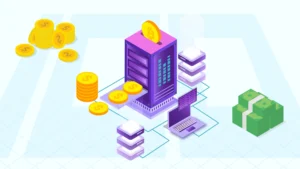
A smart contract escrow is a digital contract programmed to hold and manage funds or assets between parties involved in a transaction. This type of escrow is often used in various scenarios, such as real estate deals, freelance work, or e-commerce transactions, where trust between parties is essential.
What is an Escrow Smart Contract?
An Escrow Smart Contract is a revolutionary tool in blockchain technology that automates and secures transactions between parties by holding funds or assets until specific conditions are met. Unlike traditional Escrow Services, which rely on intermediaries, an escrow smart contract operates on a decentralized blockchain platform, ensuring transparency and reducing the risk of fraud. With the terms of the agreement encoded directly into the contract, it autonomously manages the transaction process—releasing funds only when the conditions specified by both parties are fulfilled. This innovation streamlines processes and reduces costs, making it a valuable component of Smart Contract Development for various applications, from real estate transactions to freelance work and e-commerce.
Escrow Smart Contract Example
Sure, here’s a simple example of an escrow smart contract implemented on Ethereum using Solidity:
// SPDX-License-Identifier: MIT
pragma solidity ^0.8.0;
contract Escrow {
address public buyer;
address public seller;
address public arbiter;
uint256 public amount;
enum State { AWAITING_PAYMENT, AWAITING_DELIVERY, COMPLETE, REFUNDED }
State public state;
constructor(address _seller, address _arbiter) {
buyer = msg.sender;
seller = _seller;
arbiter = _arbiter;
state = State.AWAITING_PAYMENT;
}
// Function to deposit funds into the escrow
function deposit() external payable {
require(state == State.AWAITING_PAYMENT, "Funds already deposited");
require(msg.sender == buyer, "Only buyer can deposit funds");
require(msg.value > 0, "Deposit must be greater than 0");
amount = msg.value;
state = State.AWAITING_DELIVERY;
}
// Function to confirm delivery by the buyer
function confirmDelivery() external {
require(state == State.AWAITING_DELIVERY, "Cannot confirm delivery");
require(msg.sender == buyer, "Only buyer can confirm delivery");
payable(seller).transfer(amount);
state = State.COMPLETE;
}
// Function to refund the buyer in case of a dispute
function refund() external {
require(state == State.AWAITING_DELIVERY, "Refund not allowed at this stage");
require(msg.sender == arbiter, "Only arbiter can issue a refund");
payable(buyer).transfer(amount);
state = State.REFUNDED;
}
// Function to check the current state of the contract
function getState() external view returns (State) {
return state;
}
}
-
Contract Initialization
The contract is initialized with the seller and arbiter’s addresses. The buyer is automatically set as the contract creator.
-
Deposit Function
The buyer deposits funds into the contract. The contract state changes to AWAITING_DELIVERY after the deposit.
-
Refund Function
If there’s a dispute, the arbiter can issue a refund to the buyer, changing the state to REFUNDED.
-
State Check
Users can check the current state of the contract at any time.
4 Steps to Create an Escrow Contract
Set Up the Deal
-
- Decide who is involved (buyer, seller, and arbiter).
-
- Agree on what conditions must be met (like delivering goods or completing work).
-
- Plan how to handle any issues or disputes.
Write the Code
-
- Choose a blockchain platform (like Ethereum).
-
- Create the contract using simple code (like Solidity).
-
- Include rules for sending money, confirming conditions, and resolving disputes.
Launch the Contract
-
- Deploy the contract on the blockchain using tools (like Remix).
-
- Test it first to make sure it works properly before going live.
Manage and Monitor
-
- Check the contract regularly to ensure it’s working as expected.
-
- Resolve any issues according to the contract’s rules.
-
- Update the contract if needed.
What Problems do Blockchain Escrow Solve?
Blockchain escrow addresses key problems in transactions by providing a secure, automated, and transparent way to manage funds. It eliminates trust issues by using immutable Escrow Smart Contracts that hold funds until predefined conditions are met, reducing fraud risk and ensuring fairness. This system minimizes transaction delays and costs by automating processes and removing intermediaries. It also offers clear visibility into transaction status through blockchain transparency and simplifies dispute resolution. Additionally, Blockchain Escrow facilitates international transactions by handling multiple currencies and complying with global standards, making it an efficient solution for modern transactions.
What Makes Nadcab Labs Smart Digital Escrow Special?
Nadcab Labs Smart Digital Escrow excels due to its advanced security, automation, and transparency. It uses cutting-edge blockchain technology to securely hold and release funds based on customizable conditions, minimizing fraud risk and eliminating intermediaries. The platform provides an immutable audit trail for full transparency, supports global transactions with multiple currencies, and includes built-in dispute resolution mechanisms. These features combine to offer a highly secure, efficient, and adaptable solution for managing complex transactions and agreements.







